ECB’s Next Move: How Increased Defence Spending Could Heat Up Inflation and Cool Down Growth
Europe is facing a complex economic puzzle. As nations boost their defence budgets in response to geopolitical instability, the European Central Bank (ECB) finds itself navigating a tricky balancing act. Increased defence spending, while crucial for security, can have significant knock-on effects on inflation and economic growth, potentially complicating the ECB’s efforts to maintain price stability.
The surge in defence expenditure across the continent injects a considerable amount of money into economies. This increased demand can push up prices for goods and services, particularly in sectors related to defence production, like raw materials, technology, and skilled labour. This added inflationary pressure comes at a time when the ECB is already battling high inflation driven by energy prices and supply chain disruptions. The dilemma is clear: how can the ECB effectively control inflation without stifling economic growth? Increased defence spending also diverts resources from other potentially productive sectors like education, healthcare, and renewable energy. This shift can limit long-term economic growth potential by reducing investment in areas that foster innovation and productivity.
The ECB’s challenge is to carefully calibrate its monetary policy to manage these competing forces. If the central bank raises interest rates too aggressively to combat inflation fueled by defence spending, it risks slowing down overall economic growth. Conversely, if it keeps interest rates too low, inflation could spiral out of control. The ECB needs to strike a delicate balance, taking into account the specific circumstances of each member state and the overall impact on the Eurozone. The situation requires close monitoring of inflation data, careful analysis of the impact of defence spending on various economic sectors, and clear communication with the public about the ECB’s policy decisions. It’s a complex equation, and the solution won’t be easy. Young people entering the workforce and managing their finances will feel the impact of these decisions. Understanding how defence spending influences inflation and economic growth is crucial for navigating the current economic landscape and making informed financial choices. The ECB’s decisions will shape the economic future of Europe, impacting everything from job prospects to the cost of living.





